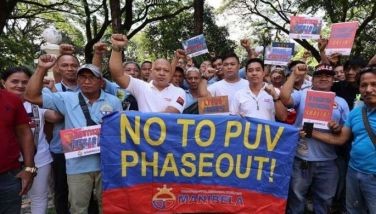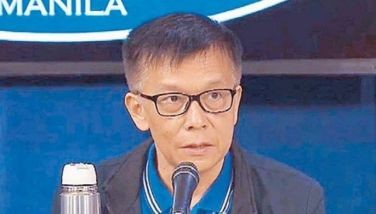Comelec to start hearings on accreditation of political parties
MANILA, Philippines – The Commission on Elections (Comelec) will start hearing the petitions of political parties to be declared as dominant majority and minority parties for the May 9 polls.
It will also hear petitions of those wanting to be counted as among the 10 major national parties and two major local parties.
The Liberal Party, Lakas-Christian Muslim Democrat (Lakas-CMD), Achievement with Integrity Movement and Laban ng Demokratikong Pilipino, all wanted to be declared the dominant majority party for the 2016 polls, while Vice President Jejomar Binay’s United Nationalist Alliance (UNA) wants to be declared the dominant minority party.
Both PDP-Laban and Nacionalista party have petitions to be declared either as dominant minority, dominant majority or just one of the 10 national parties.
At least three parties – the late senator Raul Roco’s Aksyon Demokratiko Party, National Unity Party and Kilusang Bagong Lipunan – want to be recognized among the 10 national parties.
On the regional level, those asking to be recognized as dominant regional political party are Kusog Baryohan (Davao del Norte) and Kabalikat ng Bayan sa Kaunlaran (National Capital Region); while those gunning to be recognized as major local parties are United Negros Alliance, Partido Abe Kapampangan and Arangkada San Joseno.
In the May 2013 elections, Comelec declared the Liberal Party (LP) as the dominant majority party and UNA as the dominant minority party.
Under the poll automation law, the dominant majority and dominant minority parties shall get two original copies of election returns (ER) from the Comelec and copies of the electronically transmitted precinct results.
Printed copies of ERs and certificates of canvass (COCs) shall also be given to the 10 accredited major national and local parties and their poll watchers will be given priority in cramped precincts.
In determining the dominant political groups, Comelec looks into party performance in previous elections, number of members who won and the ability to field a complete slate, among other considerations.
Vote counting machines
Comelec chairman Andres Bautista is pleased with the performance of the vote counting machines (VCMs) to be used in the May 9 polls, saying they perform better than the precinct count optical scan (PCOS) machines used in the 2010 and 2013 elections.
“We want to learn from the lessons of 2010 and 2013. We want to improve upon the performance of Comelec. That is why we have identified certain key performance areas and key performance indicators,” he said, referring to accuracy, security and transparency.
Speaking during a special general assembly of the League of Cities of the Philippines in Tagaytay City, Bautista said the “transmission of results is very important” for the coming polls, pointing out that the transmission rate was at 90 percent in 2010 and at 76 percent in 2013.
“The transmission of results should be fast because delays could lead to suspicions that some ‘magic’ is being done,” Bautista said.
He stressed that the key to transmission is the communication signals, something that Comelec is preparing for by utilizing satellites on top of the lines provided by telecommunication companies.
As for the compact flash (CF) cards for this year’s elections, Bautista said Comelec is eyeing the use of “worm cards” where you can “write once, read many.”
“The fear is that the contents of CF cards might be (edited), so we are looking for ways to make sure that this will not happen,” Bautista said, pointing out that CF cards contain information on voters and candidates in specific polling precincts.
At the Bureau of Customs, commissioner Alberto Lina denied there are still 24,000 VCMs held at the ports.
“We have released all (VCMs). Those that we know about, those that have been brought to our attention were already released,” Lina said, adding that his office will also hasten the release of the next shipment due to arrive in February.
Belle Maestro, Lina’s spokesperson, explained that the alleged delay stemmed from Comelec’s previous effort to seek tax exemption, an issue that was resolved with the poll body settling its duties and taxes.
Comelec needs about 97,000 VCMs for the May polls, with Bautista assuring that each VCM would undergo a “hardware acceptance test” at a warehouse Comelec is renting in Sta. Rosa, Laguna.
To test its accuracy better, Comelec might expand the random manual audit from only one precinct per legislative district, as provided by law, to three precincts per district.
Mock elections will be held in 30 places nationwide on Feb. 13.
“This will serve as a dry run of our elections. We’ll see what aspects we need to enhance or improve so that on (May 9) we’d have clean and orderly elections,” Bautista said.
Overseas voting
Starting tomorrow, Comelec will also start filling up the electoral boards needed to run the overseas absentee voting (OAV).
At least one special ballot reception and custody group (SBRCG) is needed for every 40,000 voters abroad. The OAV will run for a month.
Bautista also agreed to consider the use of chaplaincies abroad among the venues that could be use for OAV as suggested by Bataan Bishop Ruperto Santos, chairman of the Catholic Bishops’ Conference of the Philippines’ episcopal commission on migrants and itinerant people. – With Evelyn Macairan
- Latest
- Trending






























